Talking Heads: Alastair Campbell Meets Greg James
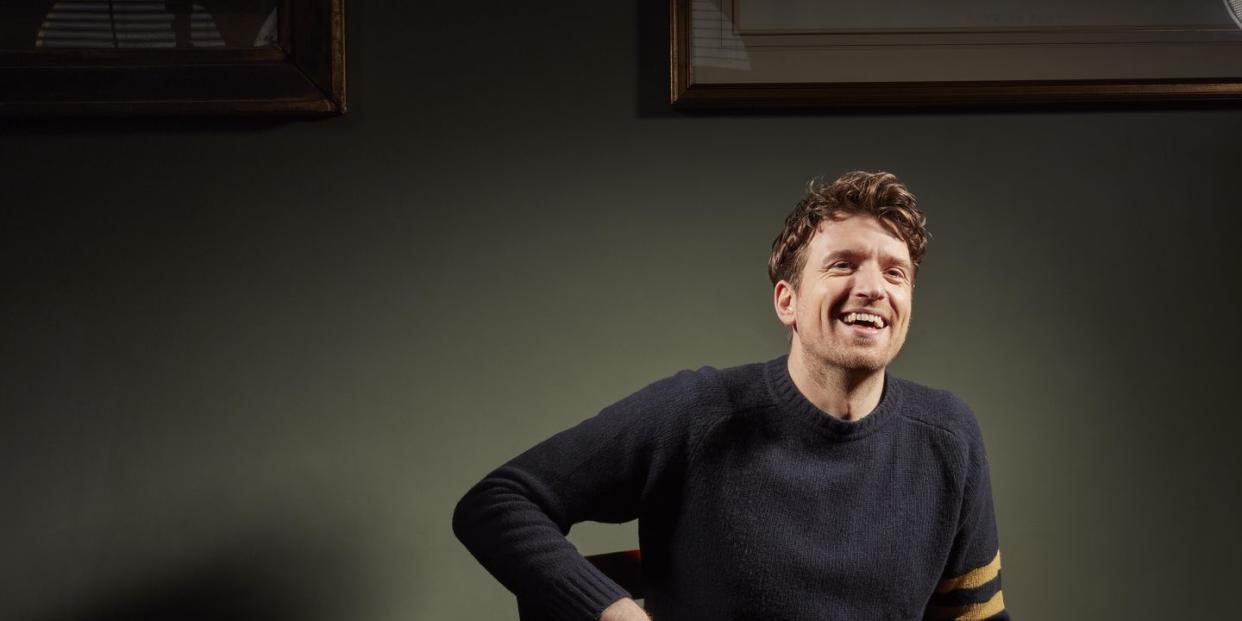
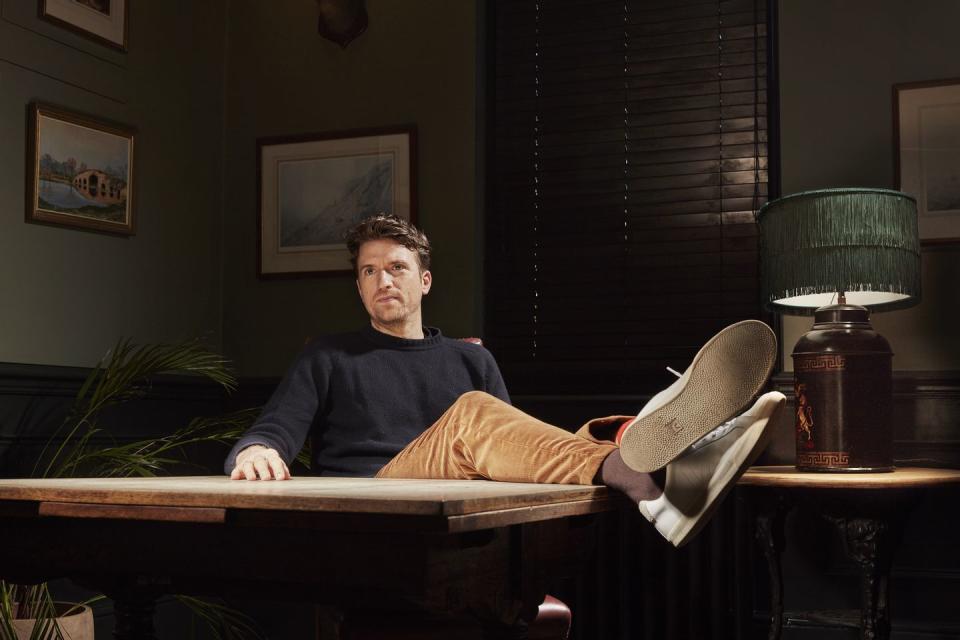
Greg James does chirpy for a living. Dragging himself out of bed when most of the nation is sleeping, he sees his job as helping the 4.7 million listeners of his Radio 1 Breakfast show to start the day with a smile on their faces and a bit of hope in their hearts. When not doing that, he is writing books for children, thinking up ideas to fulfil his ambition to write a TV sitcom, or partnering with Burnley-supporting cricketing legend Jimmy Anderson on their Tailenders podcast.
He greets me at the door of the Kentish Town home he shares with his wife, writer Bella Mackie, with a warm smile and an offer of tea. The kettle is broken, though, so he will have to boil the water in a pan. Their chocolate labrador, Barney, takes an instant liking to my groin, snuffling and licking away despite Greg’s attempts to distract him with toys. He warns me that Barney’s farts are lethal. As we stand in the kitchen of their open-plan ground floor to watch the water boil, I suggest he is harming the Ukrainian cause using up all that gas for one cup of tea. Bella appears from upstairs to say hi and announce, ‘I’m off to see my therapist. See you later.’ This is very north London.
Bella contends with severe anxiety, depression and OCD. Greg doesn’t, but his father has had his struggles with depression, and so James Jr has learned a lot about dealing with other people’s emotions and the effect they have on him. That’s a large part of why I wanted to talk to him. But there’s lots more; his obsession with cricket, and the class consciousness it awoke in him; his plans – or, it turns out, no plans – to have a family. I also wanted to get a sense of his politics – not easy with BBC employees – and whether he shares my worries about the future of the BBC. I wanted to ask about the Queen’s death, his coverage of which won praise even from the wretched Daily Mail. But this is Talking Heads, so first I wanted to get inside the head of this Lewisham-born son of two teachers and find out if he really is as happy and well-balanced as he seems. Barney, meanwhile, is determined to be involved.
AC: So, Greg, define your own mindset.
GJ: At the moment, calm and ordered; I feel I have done my to-do list for the day.
AC: What about your mindset more generally?
GJ: I overthink a lot. But I’m basically an optimist, even if I have to force it sometimes. I always think there will be something funny in the darkness. That has always been my way out of a sad situation, a bad relationship or a bad experience. I always think there must be something to take the piss out of.
AC: Your radio persona is relentlessly chirpy and upbeat. Have you ever presented the show feeling catastrophically shit inside?
GJ: Yes.
AC: How do you deal with that?
GJ: You have to do the thing you should never do, which is bury it. But it’s only for a bit. And I think sometimes, if you have a high-profile, public-facing job, you do sometimes just have to get on with it. Actually, the show was a huge form of therapy during the pandemic, being able to deal with the sad news on air in the way I wanted to.
AC: Were you a key worker?
GJ: I was, Alastair. Thanks for coming out to clap me on Thursdays. I didn’t clap, of course, I received the claps and thanked everyone for their support. Our neighbour is a Tube driver. I’m not sure he appreciated my approach.
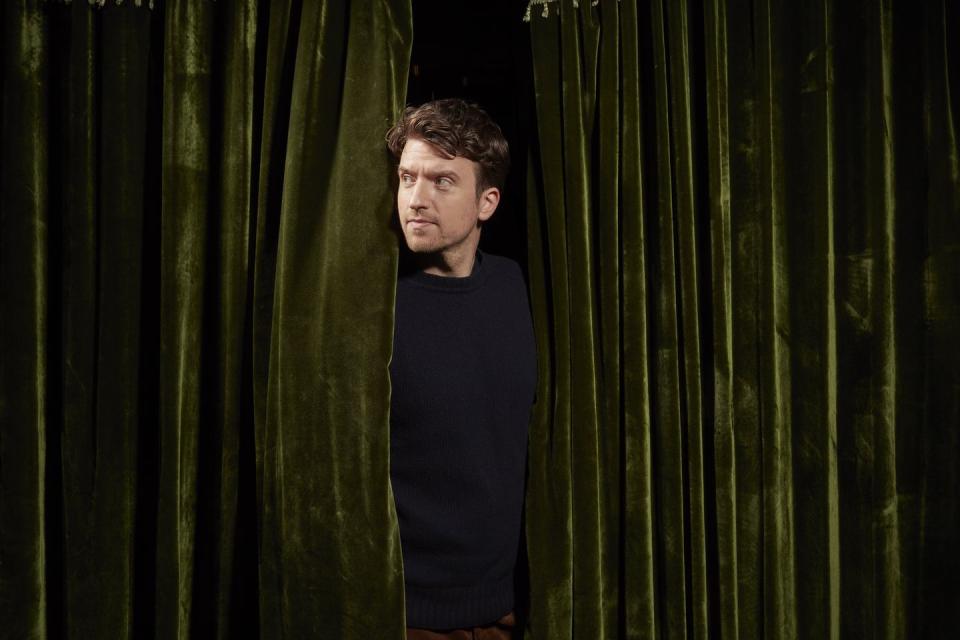
AC: Would you ever think of saying on air that you’re feeling shit?
GJ: Yes, but not to the point of bleaking out the listeners and ruining the show. I’m helping people get up in the morning to face the day, make them happier, tell them it’s not so scary out there. So I say here’s a funny thing, and then the news comes on to tell you why we are all doomed, and then I try to lift the mood again. I never say everything is fine, though. It has to be realistic. We embrace all the stuff. So I’ll talk about messages from people saying they’re having a bad day, in a dark depression or having a panic attack – we always talk about that kind of stuff. Radio 1 can do that. We have no sponsors or commercial pressures saying we want everything to be happy. It can be a very human conversation like we’re having now. You and I can talk about depression – yours, Bella’s, my dad’s – then we can switch to talking about Jimmy [Anderson] being a grumpy old shit.
AC: Do you ever worry you will run out of things to say?
GJ: No. If I did, I’d have to do something else. [Stands up] Barney! Will you please stop licking Alastair Campbell?!
AC: It’s fine.
GJ: He’s a very silly dog. When we got him, a friend said, ‘You know chocolate labradors are stupid, don’t you?’ And I said, ‘Nonsense!’ He said, ‘When was the last time you saw a chocolate labrador guide dog?’ He might have a point. The poor blind guy would be dead in weeks.
AC: Have you used that on the show?
GJ: No. Do you think I should?
AC: It’s quite funny. Back to depression. Your dad deals with it. Bella gets it.
GJ: Yes, and bad anxiety and OCD, and lots of intrusive thoughts that stick and fester and mutate.
AC: Did you see it in her from the start?
GJ: The pandemic was the thing that made it more obvious.
AC: By the way, before you shout at the dog, I think that last fart was mine.
GJ: He is without doubt one of the windiest dogs in the world… So, for a lot of anxious people, they worry about being in danger. So danger happened with Covid and they go, ‘I told you!’ Bella went, ‘I told you.’ We had talked about her mental health before, and of course I was aware because she had written about it in her book [Jog On]. It was severe anxiety hand in hand with OCD and it can be crippling. She looked so drawn.
AC: Does her voice change?
GJ: Yes, a bit, but mainly her mood.
AC: My voice goes weak when I am depressed.
GJ: Does it manifest itself physically?
AC: My voice and my eyes. People who know me can tell.
GJ: I’ve learned so much about mental health through her. We’re very open about it, which is so much better. I’ve been in a relationship with someone with anxiety and not known what to do about it. I know better with Bella.
AC: How do you cope when it’s bad? And how does Bella cope?
GJ: It depends on the severity and length of time. Sometimes it can be as simple as taking my trousers down and waving my cock around to make her laugh.
AC: Is there something especially funny about your cock?
GJ: Yeah, she has to get the binoculars out. If it’s a deeper episode, it’s about trying to talk sensibly, give her tips, ‘Call your mum, go for a run, see a friend…’
AC: So you try to fix it?
GJ: I try, but not if it’s futile.
AC: What does she do to deal with it all? She sees a therapist, I know that.
GJ: Perfect timing, wasn’t it? She runs a lot, reads a lot, listens to everything. She has medication. When she first told me she was on medication for anxiety, because of society, I guess, and general attitudes, I said, ‘Oh, really?’ When I should have been, ‘That’s cool.’
AC: Your dad has also had depression. Was he open in the same way?
GJ: No, but I don’t think he was aware. It was buried; not diagnosed properly.
AC: Would he be okay with you talking to me about it?
GJ: Yes, because he’s come a long way in the past five years. We’ve talked a lot more about it. He’s 70 this year and of a generation where it wasn’t the done thing to talk about your brain and how you felt. He was a head teacher and had to retire early because of physical illness, but we all know the mental manifests physically. So we’re talking stress, depression, anxiety, heart palpitations, getting a pacemaker and so on. But also it’s about his brain and he realises it now and does nice things to combat it.
AC: When I wrote a book about my depression, I reckon the chapter that got the biggest response was the one Fiona wrote as the partner of someone living with depression. You wrote a similar piece over Christmas for The i…
GJ: The editor said it was their most-read piece over that period. It was Bella’s idea for me to write it.

AC: What else have you learned from dealing with your dad’s depression and Bella’s condition that can help others?
GJ: Openness. With Dad, I was a kid, so he didn’t want to talk about it. He also had a huge sense of pride in where he came from to what he became. He had lots of brothers and sisters. They didn’t do further education, but he did. He got this middle-class job, became a deputy head quite young, head teacher at 47, and he couldn’t believe his brain wasn’t keeping up with it all. Retirement was hard.
AC: What do you do to look after yourself?
GJ: I’m lucky in that I don’t need medication. I see a therapist, but I don’t have those real darknesses or any crippling anxieties.
AC: Why do you see a therapist?
GJ: It’s helpful to talk to someone completely dispassionate.
AC: What have you learned from that?
GJ: That all your mad thoughts and weirdnesses and insecurities are fine.
AC: What is the maddest thought you ever had?
GJ: [Laughs] Nothing too intrusive.
AC: That one is Barney’s fart. Definitely.
GJ: [Stands up again] He’s cleared dinner parties before now. Fuck me, Barney, that one is so bad. [Goes to open doors and windows] I once joked to Bella that I wasn’t real, that I was a simulation, and she started crying. She said that was a thought she’d had about her family, her parents, me… Oh, I really want to answer that question about the maddest thought. I think it’s that everything just stops, all my work suddenly goes.
AC: What’s your biggest insecurity, apart from the one that makes you wave your willy around?
GJ: Losing my hair.
AC: Really?
GJ: Every man is worried about that. Aren’t you?
AC: A little bit. It’s already going at the front.
GJ: No, wait a minute, my biggest worry is not being mobile. I run, walk the dog, exercise. Yes, being immobile and being ill is my biggest fear.
AC: But if you had anxiety, you wouldn’t just fear it. You would think it is going to happen, for sure.
GJ: It doesn’t consume me, but it makes me do the things I need to do to be healthy. I run, I stretch…
AC: You stretch?
GJ: I do yoga. I’m a modern man, Alastair.
AC: You don’t fancy joining me in the cold-water swimming?
GJ: I’m worried I’d get addicted. Is it good?
AC: Amazing. Two degrees today.
GJ: How long do you stay in?
AC: I do two minutes per degree plus a minute.
GJ: If I wasn’t getting up so early to do the show, I would do it.
AC: What else do you do work-wise, apart from the show?
GJ: I write kids’ books. I do the Tailenders podcast with Jimmy. We’re planning a tour. We’ve got two Palladiums in March.
AC: So do Rory Stewart and I.
GJ: You did the Royal Albert Hall, which is bloody amazing.
AC: Reckon you could fill it?
GJ: We tried, but they had no dates because you two had booked it. You talking to a Tory stopped us! I like writing, too. I really want to do a sitcom. Radio was my first love and comedy is my other thing.
AC: What is your maddest idea for a sitcom?
GJ: Basically, well… [pause] I don’t know if I should tell you.
AC: Go on.
GJ: It’s called Don’t Tell Anyone.
AC: You just did.
GJ: [Laughs] The main character inherits loads of money. He has this massive wad of money but can’t tell anyone where it came from. And he has to spend it to unlock the full fortune. It’s just a loose idea at the moment.
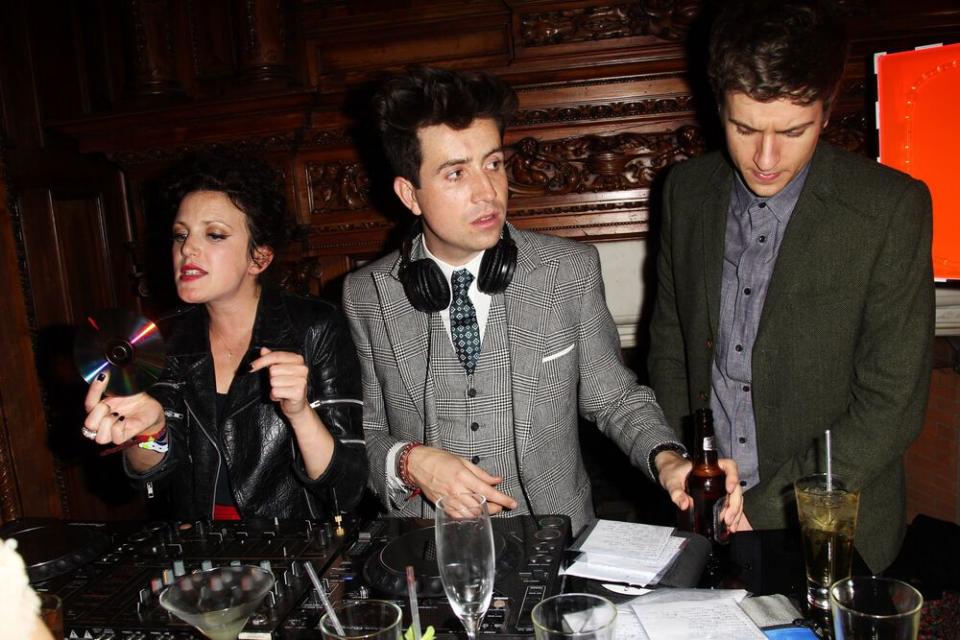
AC: How long can you do the radio show for? There’s Ken Bruce packing up after thirty-odd years. I think that would drive me mad doing the same thing for so long.
GJ: There probably will be a time because podcasting has always been part of my life, now it’s part of just about everyone’s, and I’m in a good place to use my skills.
AC: Basically, just talking off the top of your head...
GJ: Yeah, but it’s creating a community, too. You’ve done it with The Rest Is Politics. I do it with the Breakfast show, but it’s different, more transient.
AC: Do you feel you have to be well-informed and connected to events?
GJ: Absolutely. I listen to a lot of podcasts, lots of news. Bella listens to everything and tells me stuff she thinks I should know or listen to.
AC: Do you ever feel overwhelmed by the news?
GJ: Yes. I’m better at switching off on holiday now. I just read. I might not even watch cricket.
AC: What are your top five sports?
GJ: Cricket is number one by far. So far out. I love the pace, the rhythm, the slowness.
AC: So you’re a five-day man, then three days, then one day…
GJ: Absolutely. Then 20-20, then The Hundred. I will watch any Test match.
AC: New Zealand versus Pakistan?
GJ: Yes.
AC: Do you know more about cricket than Jimmy?
GJ: I’d be tempted to say yes because Jimmy pretends not to know everything, but he does. So no.
AC: How did the obsession start?
GJ: My dad, I guess. Playing with him. And my mum, who was a PE teacher. Watching on TV.
AC: Too late for the Jim Laker and Richie Benaud era?
GJ: Later. I was Christopher Martin-Jenkins and Brian Johnson, then Jonathan Agnew. I don’t follow anything closely really apart from cricket and Arsenal, and Formula One a bit.
AC: You wouldn’t watch the rugby league World Cup final?
GJ: I did watch it, for work. You need to know enough to talk about the things people are talking about. I watched the rugby league wheelchair final, too, and really got into that.
AC: Were you any good at cricket?
GJ: Not bad. I played county level at school. Hertfordshire.
AC: Does Jimmy take the piss out of that?
GJ: Yeah. He’s got me out a few times. But I got him out a couple of times in the nets. The thing about being good at cricket was that it gave me a free pass to not be bullied: ‘Leave him alone, he’s the cricketer.’ I was terrible at football, I hated rugby, so I studied in the winter and played cricket in the summer. I fell out of love with it when it started to get serious and it stopped being fun. The Tailenders podcast has made me fall in love with it again.
When I played for the county, all the other players, surprise surprise, were from private schools – St Albans, Haberdashers – and I was about the only one from a comprehensive. They hated me. I didn’t get on with them, I felt shit and I crumbled. I said, ‘I’m not good enough.’ I was actually as good as them, but the thing about these private schools is that they somehow teach confidence. I didn’t feel I fitted. And I thought, if I don’t fit, a white southern kid, if I feel overwhelmed by this, then there is a big issue here. I’m not saying I was dragged up, but there are access problems within the game. I felt overwhelmed and small and it took away the enjoyment. Then I discovered drama, and up on stage I realised I could make people laugh, I could hold an audience, and what I do now. I love it.
AC: So, Bella had a miscarriage in 2019 and I know that was tough for you both. Where are you now on having kids?
GJ: We’re just monitoring it. But basically we’re both on ‘no’ to kids at the moment.
AC: Forever?
GJ: Dunno. It’s where we are at the moment. We’re having a nice time. I’m 37 and Bella is 39. Plenty of time.
AC: You don’t want to be one of those old grey-haired dads at the school gates that everyone thinks is a grandad.
GJ: I do yoga, Alastair. I’m sprightly. We have a nice life. Bella is enjoying her success as a writer and we can take a view later. Ask ourselves: what does our life look like in 10, 15, 20 years? We’re fine without it. I guess there are consequences for later in life, when we’re two sad old people rocking away in our rocking chairs. But to be honest, all of our friends make having kids look hard. None of them look like they’re having a nice time [laughs]. We’re not short of babies and kids in our families. I would also like to go and live abroad for a year some time, somewhere hotter and with good wine. So maybe France or Italy.
AC: Are you a BBC animal? Do you worry about the future of the BBC?
GJ: I love the BBC, really care about it, fully support it and I believe in it. Am I a BBC animal? It has given me an amazing life and career and looked after me. I will always back it.
AC: It feels politically threatened, though.
GJ: It’s resilient, still there a hundred years on. It has weathered a lot of stuff.
AC: Do you worry the podcast thing will kill radio?
GJ: There will always be a place for a live radio show because of the immediacy and flexibility. I’m a big podcast fan and a podcaster. I love them. I’ve been a fan since I was 15, listening to Ricky Gervais and Stephen Merchant. But there’s nothing like radio for reaching a million people immediately: listen to this song, this interview, this silly joke. There will be more competition, but there will always be a place for that sort of radio. There will be more competition and everyone will have fewer viewers and listeners.
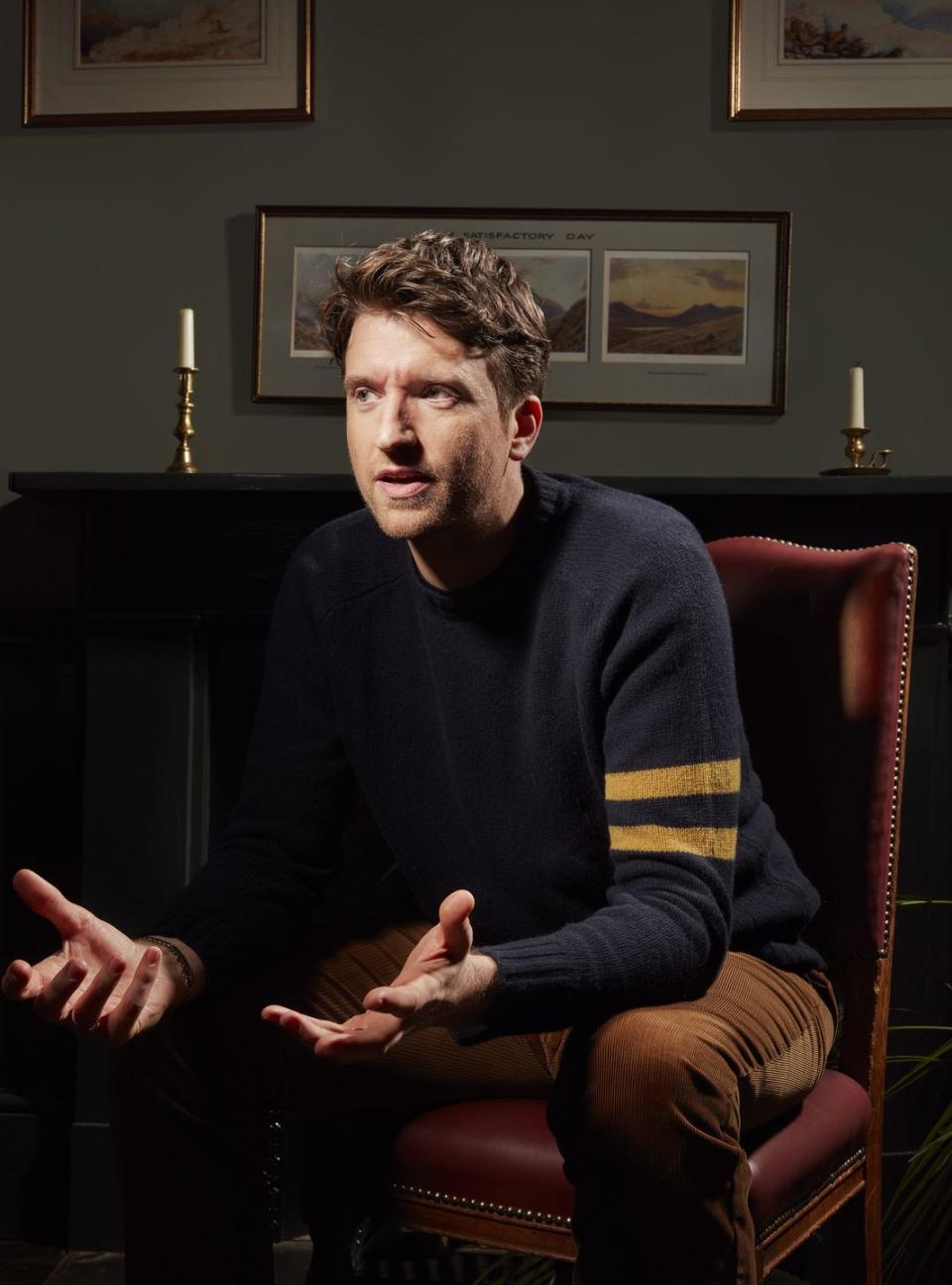
AC: I’m glad you said fewer. I had to correct Rory Stewart again this morning.
GJ: He didn’t say less when it should have been fewer, did he?
AC: He did. And he went to Eton.
GJ: And I went to good old Bishop’s Stortford High School.
AC: I’ve been there. Did a talk.
GJ: I think I knew that. So you must know Mr Etheridge.
AC: That’s the one. Simon. Loves his politics.
GJ: He was a great support to me. Lovely northern guy, big cricket fan. He is the reason I’m here now. He used to get amazing guest speakers for general studies in the sixth form. He got people like you. He got Chris Hawkins from 6 Music to come and do a talk, and no one else really gave a shit, but this was the first real-life radio presenter I ever saw, and after he spoke, I thought: I could do that. It’s just a man, just a man talking, and I thought if I worked hard and found a way in, I could do it.
AC: Isn’t it great you can relate that to a good teacher?
GJ: I had two great teachers who made me what I am. Mr Etheridge and Mr Hows. They are both still there. Dave Hows was the physics teacher, but he did extracurricular drama and he got me to read PG Wodehouse. Then I played Jeeves and fell in love with drama. I did that at university, did student radio at the same time and, yeah, those two teachers made me what I am.
AC: Mr Etheridge has asked me back.
GJ: You should go. He’d be made up.
AC: We should both go together.
GJ: Definitely. I’ve been several times now.
AC: You got a lot of praise – even from the Mail, for god’s sake – for the way you covered the Queen’s death.
GJ: That was the most interesting day of my life as a broadcaster. It was challenging. You cannot fuck up on that day.
AC: Huw Edwards told me he had been practising for years.
GJ: I didn’t practise in that way, but I thought about it. When the pandemic came along it was devastating for everyone, and I felt that personally, but it also gave us the chance to relaunch the show. It was like we didn’t know what was going on. The government didn’t know what was going on. We were there to do this thing and muddle through together. And we did the whole vaccine thing; we properly celebrated the vaccine. I was doing songs about it.
AC: Did you get grief from anti-vaxxers?
GJ: Of course. But it’s okay to anger the right people. It’s okay to anger racists and homophobes, too. With the Queen’s death, you’re thinking, ‘This is the B-B-C!’ They had been planning for that day forever. I had done these obit training days, but on the day none of it matters. The obit is done out of the news bulletin; what comes after no one knows. We had to gauge what people were thinking and I’m really proud of the judgements we made. I didn’t want to do bland generalisations – like, ‘She was the best of us, she was our grandmother, too’ – because not everyone thought that and it’s not true. But a big death is triggering for a lot of people. It reminds them of their own losses and the grief they have known or are knowing. We worked it through with the boss and the producer, Chris. We played songs with lyrics in them – which was a judgement call because when Prince Philip died there were no songs with lyrics. And people were tweeting and calling and saying, ‘Didn’t he like lyrics or something?’ With the Queen, we thought it would be unsettling if we did that again. So we played songs with lyrics, but they were checked and we definitely toned things down.
AC: Are you political?
GJ: I am.
AC: Are you constrained by your employers?
GJ: Absolutely. That is the deal and I’m fine with it. But you can do a lot to be your values without always saying your values. I grew up in a house with two teachers who always thought life was about looking after other people. I was always surrounded by people committed to kindness and caring.
AC: So you’re a hard-right, Rees-Mogg-type Tory then, yeah?
GJ: [Laughs] Behave.
You Might Also Like


